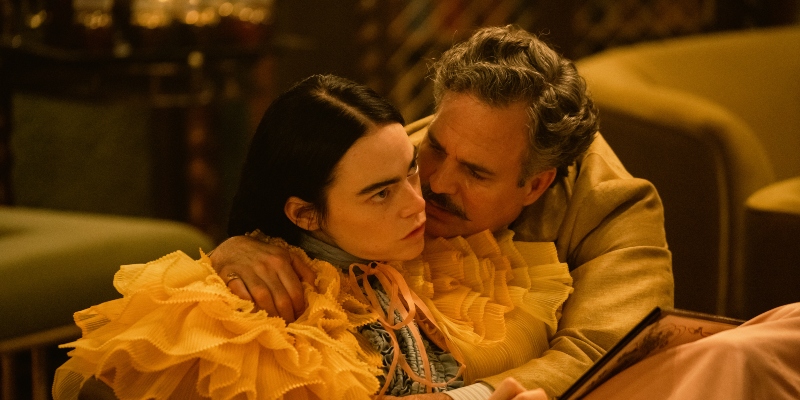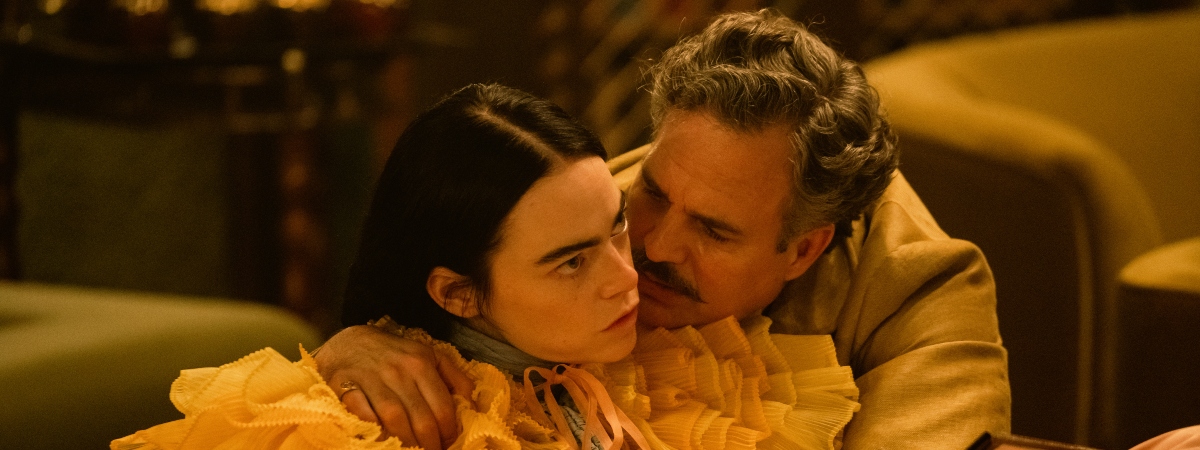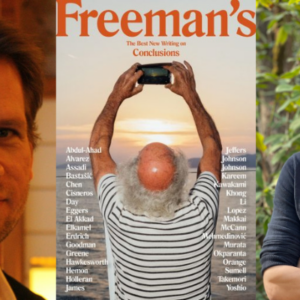This year’s New York Film Festival showcased a tightly curated lineup, including several fictional and nonfictional works based on books. Some were closely hewn adaptations, others more freewheeling, and almost all have already been secured for distribution, ensuring their imminent availability to audiences. Here’s a look at what to look out for this fall and beyond.
 Courtesy of Searchlight Pictures
Courtesy of Searchlight Pictures
Poor Things (December 8)
Based on Alasdair Gray’s Poor Things
Buoyant and bawdy, Yorgos Lanthimos’s latest film—a steampunk Frankenstein update based on Alasdair Gray’s 1992 novel—is his most easily digestible and least provocative film. Upholding what one would presume to be commonly held convictions, Poor Things is a sexual bildungsroman, a broadly feminist tale about a woman discovering her place in the libidinous desire and what she deems “furious jumping.”
The film’s unequivocal highlight is Emma Stone’s leading performance as Bella Baxter, who appears to be an adult but acts incontrovertibly like a toddler. She’s all infantile babble and incontinence, breaking plates with gleeful abandon to the chagrin of her father, the monstrously deformed, cutting edge surgeon Godwin Baxter (Willem Dafoe). Suffice it to say that the rapid aging of Bella’s brain brings a most merciful end to the overblown juvenilia that comprises the film’s first act. Bella is soon betrothed to Godwin’s assistant Max McCandles (Ramy Youssef) but elopes on the whim of sexual desires with a rakish lawyer (a hammy Mark Ruffalo) on a globe-trotting trip, where she becomes privy to the brokenness of the world and its unfair constraints on women.
As the film shifts from London to Lisbon, the black-and-white gives way to an oversaturation of color and further lavish sets, Wizard of Oz-style. Lanthimos, long recognized for employing a purposely affectless dialogue and puttered sentences that defy the primacy of language, broke that trademark with The Favourite (2018), a period piece fueled by eloquent and long-winded British-speak. As in that film, he gets his kicks in Poor Things by juxtaposing expletive-laden flourishes with refined propriety of Victorian language. Many incredulous WTFs (expertly executed by Youssef and Ruffalo) add a contemporary comedic element and anachronistic flair, much like Bella’s wardrobe and makeup, which spans ludicrously puffed shoulders, ruffled corsets, and go-go boots. The maximalist ride is mostly a confection, lacking the full political bearing of the novel.
 Courtesy of New York Film Festival
Courtesy of New York Film Festival
The Beast (TBA 2024)
Based on Henry James’s The Beast in the Jungle
Henry James’s novella The Beast in the Jungle becomes a spark plug for French filmmaker Betrand Bonello’s unparalleled and engrossing technophobia vision. The unbearable premonition that haunted John Marcher in James’s story now burdens Gabrielle (Léa Seydoux) in 1910 Paris. At a party, she happens upon Louis (George MacKay), whom she crossed paths with years ago and confided in, sharing her belief that a dreadful fate awaits her.
Bonello maintains much of the dialogue and wistful airs of the first chapter, but thereafter, everything else is subject to change. The Beast is a love story that spans time and space and takes place over three separate storylines: In 2044, artificial intelligence has taken over the workforce. In order to compete, Gabrielle reluctantly undergoes DNA purification to purge herself of pesky emotions, a now standard process that involves going back into her past lives. The Belle Epoque narrative, as it turns out, is one of her former incarnations. Another is her life as an aspiring actress in 2014 Los Angeles, stalked by an incel YouTuber modeled on mass-murderer Elliot Roger. The strongest of the three segments, this section has the distinct flair of David Lynch’s Southern California-set films, suffused with dread and longing, occasionally jolted by sportive scares, or downright eerie ones.
Caroming between the three narrative strands, the film is chaotic but not necessarily incoherent. Its ambiguities are purposeful and productive. The sophisticated execution—this is Bonello’s tenth feature—safeguards The Beast from ever straying into the domain of cliched sentimentality. Bonello wrings from James’s tale of fate and loneliness something suitably grotesque, oblique, and at times even trollish—wholly resonant with our times.
 Courtesy of New York Film Festival
Courtesy of New York Film Festival
Foe (October 19)
Based on Iain Reid’s Foe
This mildly dystopian romantic drama starring Saoirse Ronan and Paul Mescal falls egregiously short as an entry into the New York Film Festival, but when considered as part of standard mainstream cinema, it’s not as egregiously disappointing as one might think. Based on Ian Reid’s self-proclaimed “philosophical suspense story” of the same name, Garth Davis’s film adaptation is neither philosophical nor suspenseful. Gesticulating wildly at profundity, Foe remains ponderously empty. Any suspense is virtually nonexistent, any stray thrills muted into one single prolonged note of exasperation.
Henrietta (Ronan) and Junior (Mescal) reside in seclusion on a remote farm. Their tranquil existence is disrupted when a government worker named Terrance (played by Aaron Pierre) pays them a visit and announces that Junior has been selected, or rather conscripted, to live on a satellite as part of a pilot program to colonize space. To ensure Henrietta’s companionship, an AI replicant of Junior will be fashioned with Terrance’s help. He’ll interview her to get a detailed impression of their marriage, and eventually moves in with the couple for his research.
The film is meant as an uncanny probing into our changing nature of identities and shifting selfhoods during marriage. Reid is credited as a screenwriter, but it’s apparent that something crucial has been grossly misplaced in the adaptation process, especially when the most impassioned scene is Junior’s arbitrary and discomfiting tirade against a coworker’s masticating. It’s all too possible that Reid’s book simply got the better of Davis. Eagerly constructing a picturesque pink-dustbowl of a wasteland, he’s more fixated on striking a Terrence Malick-style sense of wonder than properly mining the book’s psychological tensions.
 Courtesy of New York Film Festival
Courtesy of New York Film Festival
Orlando: My Political Biography (November 10)
Inspired by Virginia Woolf’s Orlando
How does one make a transbiography in a heteronormative world? That’s the question posed by theorist, writer, and curator Paul B. Preciado in his debut film Orlando: My Political Biography. Reflecting on and refracting Virginia Woolf’s 1928 novel about a nobleman who changes gender and lives for centuries, Preciado skillfully fashions a collective portrait of transness that refuses easy categorization into the binaries of documentary and fiction, biography and poetry, and more.
A poignant melange of textures, the film alternates scenes of political history (archival footage of trans pioneers, like Christine Jorgensen) with ones of inspired originality (music sequences about the difficulties of procuring hormone therapy drugs), and blends personal anecdotes with literary text. A cast of 26 trans and nonbinary people perform light reenactments of Woolf’s novel—pie collars or white-painted eyebrows serve as visual synecdoche for the period costuming—reading aloud passages before seamlessly segueing into voicing their own formative experiences. Undoubtedly the strengths and joys of the film are its display of transgender individuals, spanning race and age, who are frequently denied the recognition and representation they deserve.

The Pigeon Tunnel (October 20)
Based on John le Carré’s The Pigeon Tunnel
The Pigeon Tunnel, Errol Morris’s documentary about spy novelist John le Carré, is best seen as a supplementary B-sides or bonus accompaniment to the author’s works. Enthusiasts will no doubt be enthralled at the opportunity to spend time with the author of The Spy Who Came in from the Cold and Tinker, Tailor, Soldier, Spy, but will not uncover much new information, while the uninitiated will find even less amusement. Similarly, fans of the filmmaker will find this modest work a slighter entry to the Morris canon.
The documentary is largely a filmed conversation between Cornwell and Morris that loosely tracks his life from boyhood to spy to novelist. As the two banter, what emerges from seemingly discursive interrogation is how the events of his childhood—namely his relationship with his beguiling con-man father—came to have an outsized influence, unwittingly preparing him for a life of subterfuge. The footage is interpolated with scenes from film adaptations of le Carré’s novels and Morris’s customary reenactments, the low-fi computer-generated quality of which undercuts any supposed seriousness of the subject.
Similarly, the content of le Carré and Morris’s conversation fails to achieve a tension that matches the haunting and layered score composed by Philip Glass and Paul Leonard-Morgan. The film, much like the memoir of the same name from which it takes its title, feels incomplete, with these recollections and dialogue forming the skeleton of a larger, more detailed story that has yet to be told.

Janet Planet (TBA by A24)
Directorial debut of Pulitzer Prize-winning playwright Annie Baker
In her directorial debut, Pulitzer Prize-winning playwright Annie Baker nimbly evokes the specificities of setting—early 90s Western Mass, awash in gentle hippiedom with transcendentalist puppeteers and earnest contra dances—but stumbles to coax out the intricate particulars of her vision onto the screen. Julianne Nicholson and newcomer Zoe Ziegler log fine performances as mother Janet and her curious, introverted 11-year-old daughter Lacey. The film, based on Baker’s original script, is composed of three acts, each showcasing the arrival of a different adult—current boyfriend, old friend, new boyfriend—into Janet and Lacey’s life, leading to a subtle upheaval. The disruptions are barely perceived, registering only by dint of Ziegler’s facial expression, like a miniscule wince or widening of the eyes.
“Scholars have written dissertations on Baker’s silences, trying to understand the way they shift her theatre toward both greater naturalism…and greater mystery,” Helen Shaw writes for The New Yorker. These magnanimous pregnant pauses of the stage lose some of their impact in the film, where in order to carry their weight, they must be augmented or anchored by something of visual import. And while Baker preserves her innate sense of comedic timing in this transition from stage to screen, some of the dialogue, particularly in the second section, feels unmoored and ever so slightly stale.


